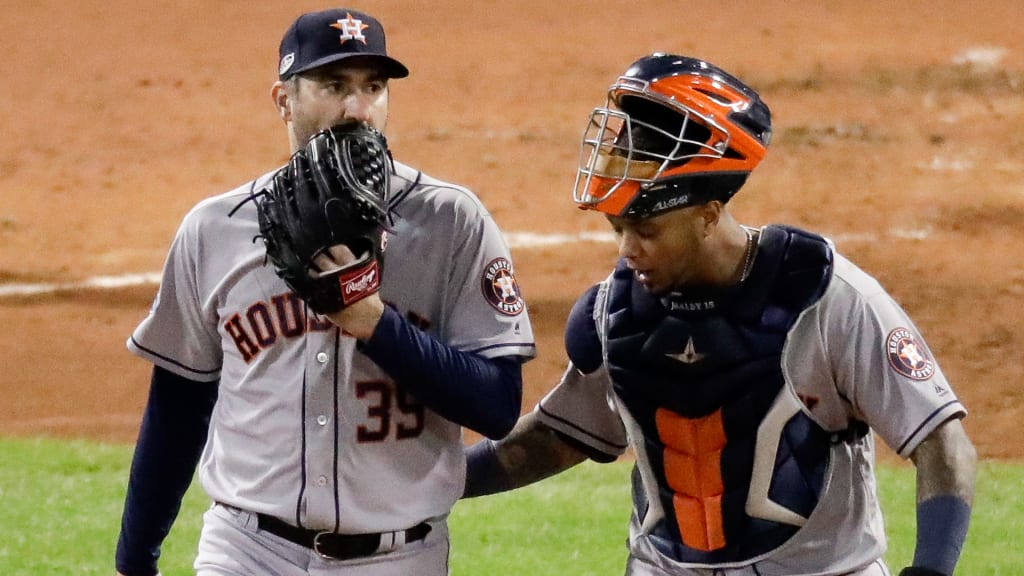
HOUSTON -- Astros pitcher Justin Verlander has an idea about how to perhaps eliminate the opposition stealing signs.
:: ALCS schedule and results ::
Verlander said Wednesday he thinks Major League Baseball should adopt 21st century technology and follow the lead of the National Football League in having the catcher and pitcher be able to communicate using wireless technology. In the NFL, coaches can call plays to the quarterback in the huddle via a wireless device in the player's helmet.
Not only would it make it nearly impossible for opposing teams to steal the signs between the catcher and the pitcher, but it would also reduce the need for mound visits and better the pace of game. Beginning this year, Major League Baseball limited mound visits to six per team per game.
"You think of all the signs everybody's going through -- between pitcher/catcher, manager/catcher, especially when a guy gets on second base, I mean the game comes to a halt when that happens," Verlander said. "It's not going to help pitch tipping, but I think it will help a lot with the sign stuff. I think this is a lot to do about nothing. I think it's more peace of mind for the pitchers.
"Especially in the playoffs, you don't want there to be any lingering doubt of anything. You want the only reason you get beat to be because you got beat. You don't want to have to think it's something else. That's why you're seeing all these advanced signs."
• Gear up for the ALCS
Verlander said he brought the topic of wireless communication to representatives of the MLB Players Association with hopes they could bring it up to MLB.
"I don't know how you would work it," he said. "Obviously the technology is there between quarterbacks and their team. I don't know whether it would be a one-way thing. I don't know if a lot of pitchers would want to wear a thing. But honestly, for me, somebody who calls my own game, for the most part, me being able to tell him what to throw or what I want to throw, I mean by the time the batter steps in there's no signals. There's nothing; we're ready to go."
Burke throws out first pitch
While much of the game was a blur, Chris Burke, for obvious reasons, has a crystal-clear recollection of much of what happened in the final moments of the the Astros' 18-inning win over the Braves in 2005.
Burke ended that game, and the National League Division Series, with a solo homer that landed in the left-field Crawford Boxes and sent the Astros to the NL Championship Series for the second year in a row. Burke remembers a lot of elation among his teammates, and a lot of relief that it was finally over.
"I think they were all glad I ended it," Burke said on Wednesday, prior to throwing out the ceremonial first pitch before Game 4 of the American League Championship Series at Minute Maid Park. "I actually got some appreciation from the Brad Ausmuses of the world for a moment like that. Everybody was ready to go home."
Burke flew to Houston from his hometown of Louisville with his 9-year-old son, Jackson, courtesy of the Astros, who throughout the ALCS have invited the team's biggest postseason stars back to take part in the pregame pomp and circumstance. Lance Berkman had ceremonial first-pitch honors before Game 3; Jeff Kent, who launched a walk-off homer in Game 5 of the 2004 NLCS, will appear before Game 5. Burke threw the pitch to another Astros postseason hero, former pitcher Brandon Backe.
Burke, who is now a college baseball announcer, expressed fond memories of his time with the Astros and recalled his big home run with humor. He also revealed that the moment came close to having a much different outcome.
"I was going to bunt," Burke said. "I remember going up to bat and thinking, 'Man, Chipper Jones has been playing third base for six hours. No way he's ready to field a bunt right now."
Burke squared to bunt, but pitcher Joey Devine threw a wild pitch to the backstop. Burke then decided to look for something he might be able to knock into the seats.
"It was one of the rare moments as a hitter where you think about hitting a home run, you get a rare pitch to do it on and you actually execute," he said. "It was one thing that made the moment special."